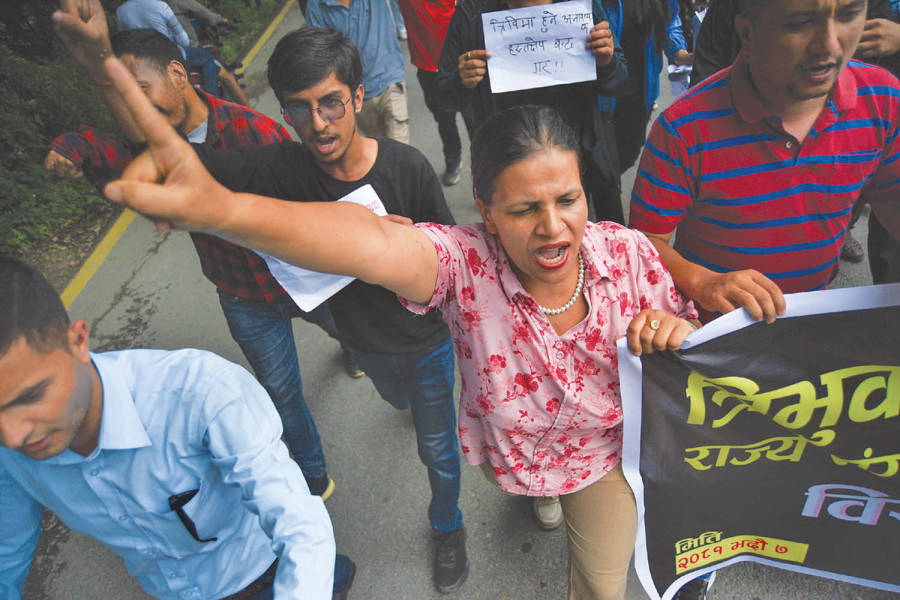National
Minister Bhattarai building on predecessor’s efforts to tackle political influence in education
Says partisan interference is causing degradation of Nepal’s education sector, and politicisation will not stop without strong commitment from parties.
Post Report
Minister for Education, Science and Technology Bidya Bhattarai is continuing her predecessor’s efforts to curb politicisation in the education sector.
During an interaction with journalists on Wednesday, the minister said she has started consultations with top leaders from various parties for their commitment to prevent political interference in schools and universities. Bhattarai stated that partisan interference is a major factor responsible for the degradation of the entire academic sector, and that she is actively working to stop the malpractice.
“I had invited the general secretaries from different parties to discuss the matter. Except for the Nepali Congress, whose general secretaries did not attend citing busy schedules, I did have discussions with those from the CPN-UML and the Rastriya Swatantra Party,” she said. “Although we could not reach any conclusion, discussions have at least begun. Politicisation will not stop without strong political commitment against it.” She also informed that she was working on an education reform plan by incorporating inputs from political parties. Bhattarai, a UML leader, became the education minister in the Oli Cabinet on July 15.
Her predecessor Sumana Shrestha had started efforts to reduce politicisation in the academic sector, particularly teachers and professors involved in party politics. Her actions, however, were criticised by the top leaders of all major parties—the Nepali Congress, the UML and the CPN (Maoist Centre). Soon after assuming office, Shrestha had sought information from the Election Commission and district education units on teachers and professors affiliated to political parties.
The initiative was taken as per the Political Parties Act, 2017, which prohibits teachers, professors and government employees from engaging in politics. Similarly, the Patan High Court on October 5, 2021 had ruled that schoolteachers cannot engage in active politics. Responding to a writ petition, the court said those drawing salaries and benefits from state coffers should not be involved in partisan politics.
As per her claim, a total of 825 teachers across the country voluntarily resigned their political party memberships during her tenure as the minister. She had also claimed that 20 teachers associated with political parties resigned after the ministry started taking actions against the party-affiliated teachers.
Politicisation in the academic sector has been further fuelled by partisan influence in school and university appointments, as well as sharing of crucial university positions among political parties.
Only last week, Bhattarai had publicly requested Minister for Home Affairs Ramesh Lekhak to ensure security at the Tribhuvan University amid a dispute over an appointment.
The dispute emerged when Kusum Shakya, Dean of the Faculty of Humanities and Social Sciences, nominated Tikaram Gautam for appointment as head of the Department of Sociology although Pasang Sherpa was senior than Gautam.
As per the university records though both Sherpa and Gautam are associate professors, Sherpa had joined the university four years earlier. Nepali Congress students at the university, however, wanted Gautam to be the department head. A leader of the Nepal Students’ Union, the sister wing of the Congress party, had threatened physical action against the university’s vice-chancellor, rector and registrar if Sherpa was appointed over Gautam.
The university authority, following the threats, refrained from going to their offices and wrote to the education minister asking for security. Minister Bhattarai, subsequently, made a public request to the home minister for security arrangements.




 10.12°C Kathmandu
10.12°C Kathmandu














